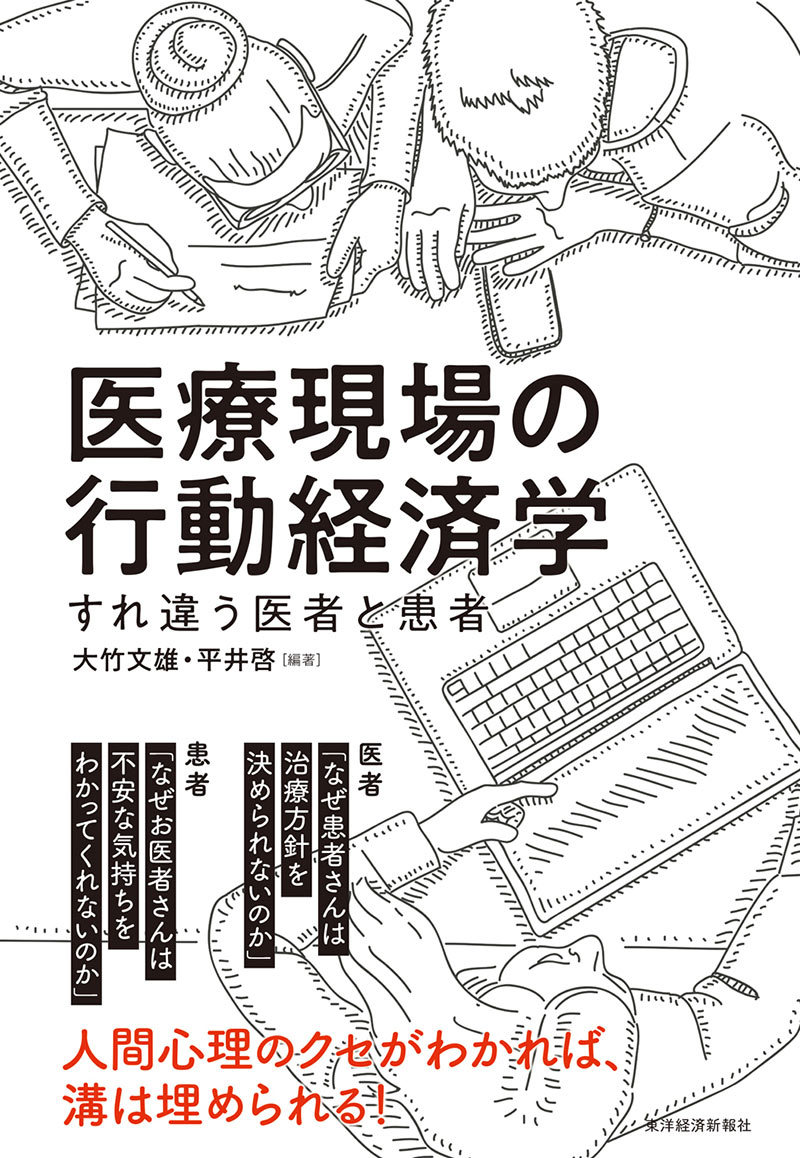Behavioral Economics in Medical Practice
The Differing Thoughts of Doctors and Patients
Doctor: "Why can't a patient decide on a treatment plan?"
Patient: "Why can't a doctor understand my anxiety?"
By understanding human psychology, we can bridge the gap!
"I've come this far with the method, so I want to continue."
"I'm still okay, so I'll just stay with this treatment."
"I saw the ad that said 'Cancer is gone.'"
"He refuses to have life-prolonging treatment, but we, his family, want him to have it."
"Once I start ventilatory management, I can't stop it."
This book analyzes the decision-making of patients, their families, and medical professionals from the perspective of behavioral economics, based on examples of conversations in the medical field.
This book will help both doctors and patients to make better decisions!
Must-read for shared decision-making.
Since its publication in July 2018, it has sold more than 24,000 copies in eight printings in Japan!
Click here for inquiries regarding book rights
Overview
Why does "inability to decide" and "procrastination" occur in medical practice? With behavioral economics, this book presents the theoretical background and solutions.
Table of Contents
Chapter 1: Conversations in Medical Practice
Chapter 2: Framework of Behavioral Economics
Chapter 3: Current Status of Medical Behavioral Economics
Part 2: Decision-making by Patients and Families
Chapter 4: How can we provide appropriate decision-making support in cancer treatment?
Chapter 5: How can we increase the cancer screening uptake rate?
Chapter 6: Why is preventive action against cervical cancer not being taken?
Chapter 7: How can we reduce the regret of bereaved families?
Chapter 8: How can we provide appropriate decision-making support for elderly patients?
Chapter 9: How to express the will for organ donation
Part 3: Decision-making by Medical Professionals
Chapter 10: Why can't we stop ventilatory management once it is started?
Chapter 11: Why is decision-making in the acute phase so difficult?
Chapter 12: Why do doctors differ in their practice patterns?
Chapter 13: Are people who care about others better suited to be nurses?
Author Profile
Fumio Ohtake was born in Kyoto Prefecture in 1961, graduated from the Faculty of Economics, Kyoto University in 1983, and completed the Master's Course at the Graduate School of Economics, Osaka University in 1985.
After working as an assistant at the Faculty of Economics, Osaka University, and as a professor at the Institute of Social and Economic Research, Osaka University, he became a professor at the Graduate School of Economics, Osaka University in 2018. D. in economics, and he specializes in labor economics and behavioral economics.
For "Inequality in Japan" ( Nikkei Inc.), he received the Nikkei Prize for Excellent Books in Economic Science in 2005, The Suntory Prize for Social Sciences and Humanities in 2005, and the Mainichi Shimbun Economist Award in 2006.
He received the Ishikawa Prize from the Japan Economic Association in 2006 and the Japan Academy Prize in 2008.
He is the author of "The Sense of Economic Thinking," "Competition and Fairness," and "How to Walk in a Competitive Society" (all published by Chukoh Shinsho).
Kei Hirai(Editor and Author)
Born in Yamaguchi Prefecture in 1972, Kei Hirai completed his master's degree at the Graduate School of Human Sciences, Osaka University in 1997.
After working as an assistant at the Faculty of Human Sciences, Osaka University in 1997, and as an associate professor in the Office of Large-Scale Education and Research Project Support, Future Strategy Organization, and Corporate Planning Office at the same university, he became an associate professor at the Graduate School of Human Sciences, Osaka University in 2018.
D. in Human Sciences, and has been a supervising health psychologist at Kishiwada Municipal Hospital since 2010. He specializes in health and medical psychology, behavioral medicine, psycho-oncology, and behavioral economics.
He received an incentive award from the Japanese Society of Psycho-oncology in 2007 and an incentive award for practical activities from the Japanese Society of Health Psychology in 2013.

